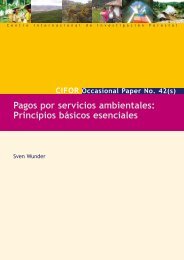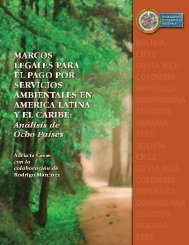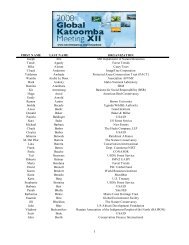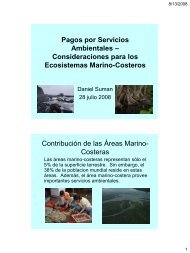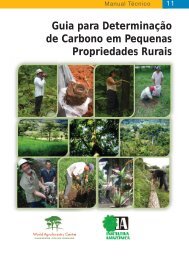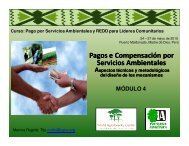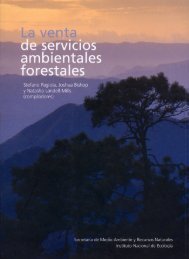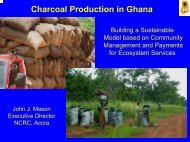Guide on Climate Change and Indigenous Peoples
Guide on Climate Change and Indigenous Peoples
Guide on Climate Change and Indigenous Peoples
- No tags were found...
You also want an ePaper? Increase the reach of your titles
YUMPU automatically turns print PDFs into web optimized ePapers that Google loves.
Article 3 of the United Nati<strong>on</strong>s Declarati<strong>on</strong> <strong>on</strong>the Rights of <strong>Indigenous</strong> <strong>Peoples</strong>“<strong>Indigenous</strong> peoples have the right to self determinati<strong>on</strong>. By virtue of that right theyfreely determine their political status <strong>and</strong> freely pursue their ec<strong>on</strong>omic, social <strong>and</strong> culturaldevelopment.”The right to self-determinati<strong>on</strong> is manifested in the following: 1Aut<strong>on</strong>omy or self-government in matters relating to their internal <strong>and</strong> localaffairs, as well as ways <strong>and</strong> means for financing their aut<strong>on</strong>omous functi<strong>on</strong>s.In other cases, indigenous peoples seek the c<strong>on</strong>diti<strong>on</strong>s for self-management.Respect for the principle of free, prior <strong>and</strong> informed c<strong>on</strong>sent. This principleimplies that there is an absence of coerci<strong>on</strong>, intimidati<strong>on</strong> or manipulati<strong>on</strong>,that c<strong>on</strong>sent has been sought sufficiently in advance of any authorizati<strong>on</strong>or commencement of activities, that respect is shown for time requirementsof indigenous c<strong>on</strong>sultati<strong>on</strong>/c<strong>on</strong>sensus processes <strong>and</strong> that full <strong>and</strong>underst<strong>and</strong>able informati<strong>on</strong> <strong>on</strong> the likely impact is provided.Full <strong>and</strong> effective participati<strong>on</strong> of indigenous peoples at every stage ofany acti<strong>on</strong> that may affect them direct or indirectly. The participati<strong>on</strong>of indigenous peoples may be through their traditi<strong>on</strong>al authorities or arepresentative organizati<strong>on</strong>. This participati<strong>on</strong> may also take the form ofco-management.C<strong>on</strong>sultati<strong>on</strong> with the indigenous peoples c<strong>on</strong>cerned prior to any acti<strong>on</strong>that may affect them, direct or indirectly. C<strong>on</strong>sultati<strong>on</strong> ensures that theirc<strong>on</strong>cerns <strong>and</strong> interests match the objectives of the activity or acti<strong>on</strong> that isplanned.Formal recogniti<strong>on</strong> of indigenous peoples’ traditi<strong>on</strong>al instituti<strong>on</strong>s,internal justice <strong>and</strong> c<strong>on</strong>flict resoluti<strong>on</strong> systems, <strong>and</strong> ways of socio-politicalorganizati<strong>on</strong>Recogniti<strong>on</strong> of the right of indigenous peoples to freely define <strong>and</strong> pursuetheir ec<strong>on</strong>omic, social <strong>and</strong> cultural development.is the violati<strong>on</strong>s of theirrights to l<strong>and</strong>s, territories<strong>and</strong> natural resources.This problem persists withworsening effects to themin terms of scale <strong>and</strong> depthespecially in countrieswhere nati<strong>on</strong>al laws recognizingindigenous peoples’l<strong>and</strong> rights are absent.The aggravating factor inmost countries is that theexistence of indigenouspeoples is not recognizedin any law or in any policy.Such denial of l<strong>and</strong> <strong>and</strong>What is FPIC?... the c<strong>on</strong>sensus/c<strong>on</strong>sent of indigenouspeoples determined in accordance withtheir customary laws <strong>and</strong> practices.This does not necessarily mean that everysingle member must agree, but rather thatc<strong>on</strong>sensus will be determined pursuant tocustomary law <strong>and</strong> practice. In some cases,indigenous peoples may choose to expresstheir c<strong>on</strong>sent through procedures <strong>and</strong>instituti<strong>on</strong>s that are not formally or entirelybased <strong>on</strong> customary law <strong>and</strong> practice, suchas statutory councils or tribal governments.Regardless of the nature of the process, the(C<strong>on</strong>tinued next page)PART IX: Ways Forward: The UN Declarati<strong>on</strong> <strong>on</strong> the Rights of <strong>Indigenous</strong> <strong>Peoples</strong>... 141



